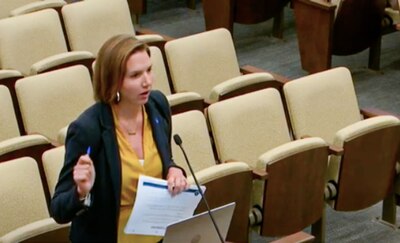When a leaked video showed Tennessee Gov. Bill Lee sitting quietly while a key education adviser declared that teachers are “trained in the dumbest parts of the dumbest colleges in the country,” public outrage was swift and heated.
Educators and Democrats called on the Republican governor to repudiate Hillsdale College President Larry Arnn’s comments and sever ties with the small private Michigan school and its charter school work. Lee’s allies in Tennessee’s Republican Party and charter sector bristled. And one charter school preparing to open near Chattanooga ditched its plan to use Hillsdale curriculum.
In the end, three local school boards — two of which cited Arnn’s statements — denied a Hillsdale-affiliated group’s applications to open charter schools. They were to be the first trio out of 50 “classical” charter schools that Arnn pledged to bring to Tennessee under an informal agreement with the governor.
The charter network, called American Classical Education, has since appealed those decisions.
Now the fate of the network’s ambitious plans — which would change the face of the state’s 100-plus-school charter sector by introducing a different kind of model and targeting different student demographics — lies with a new state commission and the nine people appointed to it by the governor who wants Hillsdale in Tennessee.
Their votes, which are set for October after a series of reviews and public hearings, will mark the first major test for the Tennessee Public Charter School Commission.
Speaking recently with Chalkbeat, several commissioners promised that politics won’t play a part in their decisions about the three Hillsdale-related appeals, as well as at least nine other charter appeals coming before the body this fall.
“I advocate for what’s best for all students and families,” said Terence Patterson, who serves on the commission and is also president of the Memphis Education Fund.
Another commissioner, Eddie Smith, suggested the panel will set aside Arnn’s statements and consider each appeal on its merits.
“At the end of the day, we’re asking if it’s good for students, and does it have community buy-in? Yes or no,” said Smith, a former GOP lawmaker from Knoxville. “We have to strip everything else away.”
Others say the deck is already stacked in Hillsdale’s favor.
“By its very nature, the charter commission is political,” said Rep. Antonio Parkinson, a Memphis Democrat who opposed its creation. “The governor backed the bill that created the commission, and he appointed its members.
“It will be very, very interesting,” Parkinson continued, “to see whether the commission will now go against the governor’s chosen group for bringing charter schools to Tennessee, especially after all the outrage over Mr. Arnn’s comments.”
Tennessee meets Hillsdale
Founded in 1844 as a nondenominational Christian school, Hillsdale College emphasizes classical liberal arts and has an enrollment of about 1,500 students on its campus in south central Michigan. In recent years, the tiny college has gained national prominence under the leadership of Arnn, who serves on the board of the conservative Heritage Foundation and headed former President Donald Trump’s 1776 Commission. That panel supported “patriotic education” in response to The New York Times’ 1619 Project, which frames U.S. history through the lens of the Black experience.
Hillsdale’s charter school initiative grew out of its own private grade school that opened on the campus in 1990. Today, Hillsdale’s independently operated charter management organization, American Classical Education, is tied to its growing network of 23 member schools in 12 states, plus affiliations with dozens of other private, charter, and parochial schools that use Hillsdale curriculum and faculty training.
Hillsdale’s “classical” school model promises a liberal arts and sciences education, integrated with instruction about the principles of moral character and civic virtue. The focus is on core subjects of math, science, literature, and history, as well as the study of Latin, music, and the arts. Literacy instruction is phonics-based, while history and civics are taught using Hillsdale’s K-12 curriculum that emphasizes America’s strengths rather than its shortcomings.
As governor of Tennessee, Lee visited Hillsdale’s campus for a 2019 Presidents Day event to speak with leaders whom he later called “champions of American exceptionalism.” At his annual state address in January, he called the school a “standard bearer in quality curriculum” and announced that Tennessee was “formalizing a partnership with Hillsdale to expand their approach to civics education and K-12 education.”
The partnership, it turned out, was Lee’s informal invitation to Arnn to bring Hillsdale-affiliated charter schools to Tennessee through the state’s existing application and appeals processes. Lee told Arnn he wanted a hundred new Hillsdale schools planted across Tennessee; Arnn said he could manage 50, and American Classical submitted its first three applications to local school boards in Madison, Montgomery, and Rutherford counties. The three suburban counties currently have no charter option.
Before heaping praise on Hillsdale and its ideological bent — an unprecedented endorsement of a charter group by a Tennessee governor — Lee had made clear on the campaign trail that he wanted to give parents more education choices for their children. After his longshot victory for governor in his first run for public office, the Williamson County businessman quickly set out to pass a private school voucher law and bolster charters with additional funding and new legislation. He was the driving force behind a 2019 state law creating a new commission that essentially was charged with bringing more “high quality” public charter schools to Tennessee.
The law requires charter operators to apply first to school boards to operate under a local district’s purview. If denied there, they can appeal to the state commission, which also has authority to open charter schools in its own state-run district if the applications are approved on appeal.
The commission took over those responsibilities last year from the Tennessee State Board of Education, which generally had shown deference to local decisions on charters that were historically limited to the state’s four largest cities.
But now, when overruling local boards, the commission can place new charter schools anywhere in the state. Earlier this year, it overruled a board decision in Rutherford County, south of Nashville, and authorized the state’s first non-urban charter school, set to open in the 2023-24 school year.
Hillsdale bombshell
School boards in Madison, Montgomery, and Rutherford counties were weeks away from voting on American Classical’s revised applications when a Nashville TV station broke the story in June about Arnn’s comments. It was based on a hidden-camera video obtained by WTVF reporter Phil Williams during an invitation-only reception hosted by Hillsdale and attended by Lee in Franklin, south of Nashville.
In the nearly two-hour video, Arnn compared modern education to “the plague” that “destroys generations of people.” And he said school administrators are essentially “diversity people” with degrees in education “where you don’t have to know anything.”
“The teachers are trained in the dumbest parts of the dumbest colleges in the country,” Arnn said, prompting laughter from the crowd.
“We are going to try to demonstrate that you don’t have to be an expert to educate a child, because basically anybody can do it,” he said.
Behind closed doors, according to the report, Lee had nothing but praise for Hillsdale. At one point, he told the crowd that he believed Hillsdale’s approach “is a vision that Tennesseans will embrace.”
But educators were incensed.
Higher education officials called Arnn’s statements “demeaning,” “uninformed,” and “deeply offensive.”
“I care little that Mr. Arnn mischaracterizes bright, dedicated professionals to build his case. That’s his shtick,” tweeted Dan Lawson, a retired superintendent who teaches educational leadership at Lee University. “I am repulsed that Bill Lee finds him a viable public school partner utilizing public monies.”
The state superintendents organization issued a statement saying Arnn’s criticism of public schools and teachers “is driven by his desire to expand his charter school empire into Tennessee.”
A raft of school boards passed resolutions condemning Arnn’s message and supporting the state’s 63,000 public school teachers.
And hours after the governor refused to disavow Arnn’s words during his first public comments about the video, his own education chief, Penny Schwinn, a former charter school leader, got in hot water with Lee’s office for a tweet in praise of Tennessee teachers.
The school board in Jackson-Madison County was the first to deny American Classical’s application, after district officials said the network failed to meet the state’s criteria. The board also passed a resolution saying it wasn’t in their students’ best interest to be “exposed” to a Hillsdale-related charter school because of Arnn’s “low opinion of school teachers and administrators.”
Deputy Superintendent Vivian Williams said the district’s 12-member review team, which she chaired, identified concerns around operations, finance, and especially academics.
“There was no clear plan for interventions to ensure that students who are struggling would receive effective instruction, especially for migrant students, students who have disabilities, and those who speak English as a second language,” Williams told Chalkbeat. “They basically said their curriculum is diverse and designed for all students.”
Days later, Rutherford County’s school board denied a similar application after its review team dinged the operator’s plans for academics and operations. District officials said American Classical’s ties to Hillsdale also “have become increasingly problematic.”
“Members of the (district’s) review committee have expressed serious concerns about Dr. Arnn’s comments regarding teacher qualifications and education, as it brings into question the applicant’s ability or interest in recruiting licensed teachers,” the district stated about its review of the application.
All three of American Classical’s applications seek waivers from state requirements for educator salaries and faculty-related personnel policies such as evaluations, tenure, and leave. However, it’s not uncommon for charter operators to seek flexibility on such matters.
Outlining their plan for hiring educators in Tennessee, American Classical’s applications acknowledge a national teacher shortage but say many teachers are attracted to the classical education model. They specified graduates from teacher training programs, people changing careers after significant professional experience, and retired or nearly retired educators. One potential pipeline, they say, is Hillsdale College, including graduates of its Classical Education Graduate Program.
“Teacher quality is fundamental to student success,” states the application to Clarksville-Montgomery County Schools, where the district’s board also denied American Classical’s application, partly because of its personnel-related waiver requests.

American Classical hits back
By early August, the charter network had submitted appeals for all three denials with the new state commission appointed by Lee.
“We ask the Commission to do what the Board did not,” the network wrote in two of its appeals. “Keep politics out of the process, conduct a rigorous application review, and — if the application meets the standard and authorization is in the best interests of the students, district, or community — to approve the charter.”
The network charged that Jackson-Madison County Schools had used a “substandard review process” and that the board’s decision in Rutherford County was “colored by politics” based on Arnn’s statements instead of the merits of the application. It said Montgomery County is already straining under its growing population of school-age children and that, with 43% more growth projected over the next 20 years, authorizing a new charter school will help the Clarksville community keep up.
The network also complained that the Madison and Rutherford districts, in particular, had wrongly emphasized American Classical’s ties to Hillsdale College. The school “will be operated by American Classical Education, a nonprofit organization separate from Hillsdale College,” said one network statement to the state commission.
Since its initial applications, which listed multiple Hillsdale employees as board members, American Classical has reduced the number of individuals with Hillsdale connections and added four Tennessee residents to its board: recently retired state Sen. Dolores Gresham, a Republican from Somerville, near Memphis; Dennis Pearson, an associate economics professor at Austin Peay State University in Clarksville; Michelle Garcia, a conservative activist in Murfreesboro; and Rick Kucera, a Hillsdale alum who lives in the Johnson City area.
Gresham, who chairs the network’s board in Tennessee, did not respond to Chalkbeat’s multiple requests for comment.
Hillsdale Chief of Staff Michael Harner, who is listed as the board’s chair and primary contact on all three initial applications in Tennessee, said American Classical meets Tennessee’s legal requirements to sponsor a charter school — and brings with it a wealth of experience.
“Friends of Hillsdale College formed [American Classical Education] to support the efforts of parents and community members to found classical public charter schools,” Harner told Chalkbeat in a statement.
Several district leaders in Tennessee said they still have many questions.
Tiffany Johnson, outgoing chair of Rutherford County’s board, said the network was neither transparent nor collaborative during the application process, which doesn’t bode well when seeking to partner with a school system to operate a new public charter school.
“Unfortunately, there was an arrogance about American Classical from the beginning,” said Johnson. “I don’t know if that’s because they were publicly backed by our governor, who has made this political. But I can assure you that our vote was not political. We were looking for what’s in the best interest of our students.”
Damage control
Arnn tried to clarify his comments in a column published by The Tennessean on July 18.
“Dumb can mean ‘unintelligent,’ which I did not mean,” he wrote. “Dumb also means ‘ill-conceived’ or ‘misdirected,’ which is, sadly, a fitting description for many education schools today.”
The governor also tried to clarify his relationship with Arnn and noted that they’ve spoken “maybe five times over the last two years.”
“There’s a lot of conversation about other people’s words,” he told reporters recently. “And there’s a lot of folks who actually don’t want choice for families and for parents. … But I’m staying focused on what my view is of the future of education in our state.”
Asked whether he expects the new commission to approve American Classical’s charter applications, Lee said he expects the panel to follow state policies that are designed to bring “high-quality public charter schools to Tennessee.”
“Every charter management organization in our state follows the same process, and Hillsdale will do that as well,” he said.
What is that process?
The commission and local districts use the same scoring criteria to decide whether an application meets the state’s standards for academics, operations, and finances, plus whether its proposal is in the best interests of students, their school district, and their community. Local boards and the commission also use the same state authorizing standards to guide their work on charter governance.

“We ground ourselves in the process, and we are agnostic when it comes to the application that we are reviewing, because we want to ensure the integrity of the process,” said Tess Stovall, the commission’s executive director, who will make yay-or-nay recommendations for the state panel to vote on.
Stovall, who previously led the appeals process for the State Board of Education, has participated in 37 reviews from new charter applicants since 2014. The state approved a third of those.
“I do not take lightly the charge that the governor and the General Assembly have given the commission in its creation — to be a model (charter) authorizer in this state and within the nation,” Stovall told commissioners during a January meeting.
Now it’s up to that new entity to decide whether Hillsdale brings its charter model to Tennessee.
But the fallout over Arnn’s remarks presents a challenge, acknowledged Rep. Mark White, a fierce charter advocate who sponsored the legislation that created the commission.
“We cannot allow the commission to get caught up in something political because that would taint its integrity,” said the Memphis Republican, who chairs a key education committee in the legislature. “The commission must approve or disapprove charters based on the qualifications before them.”
No matter the outcome, White believes that Arnn’s highly publicized words have made it harder for American Classical — and for every would-be charter operator in Tennessee.
“The charter conversation now has nothing to do with charters, but it has everything to do with a comment that you can’t explain away,” he said.
“It’s set us back years.”
Marta W. Aldrich is a senior correspondent and covers the statehouse for Chalkbeat Tennessee. Contact her at maldrich@chalkbeat.org.


